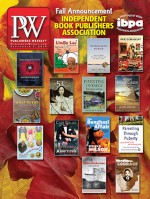Catholics got a real punch in the gut from this summer’s report of pedophilic priests in Pennsylvania. Just when we thought the church and its people were on their way to spiritual and emotional recovery, along come more dreadful revelations of clerical abuse, heartbreakingly detailed in a massive report. It’s enough to make even the most devout Catholic want to walk away.
But what of those whose Catholic-themed books are scheduled for publication later this year? Promoting any kind of faith-based work is daunting enough, but this certainly is not a case of bad publicity being better than no publicity at all. The harsh fact is, there has always been an element of anti-Catholicism in both society and the publishing industry—and even within the defined genre of Christian writing. Some readers will not even consider buying a book dealing with a Catholic subject, feeling that, if they did so, they would be supporting an evil monolithic institution that encourages its clergy to abuse and harm children. And there will be no convincing them otherwise.
Christian or religious publishing in general has always been a niche category. It’s not designed to appeal to everyone; it can’t. And Catholic publishing is an especially narrow niche—although the 70 million Catholics in the U.S. alone are largely still an untapped resource.
Catholic literature enjoyed great popularity in the last century, perhaps beginning with Thomas Merton’s Seven Storey Mountain, which turns 70 in October. Priests and practicing Catholics alike were portrayed in a positive way in 20th-century movies such as Boys Town (1938) and Going My Way (1944), although much of that changed with Graham Greene’s book The Power and the Glory in 1940 and his “whiskey priest” characters, as Catholic literature of the time tried to present an honest, realistic view of the changing church. And since the church is constantly changing—albeit slowly—there’s still plenty to write about.
To understand how Catholic readers might respond to the newest scandal, as a writer or publisher it helps to talk to ordinary Catholics. And believe me, we’ve all been talking about this: over dinner tables; at summer barbecues, cocktail parties, and casual get-togethers; in the vestibule after Sunday Mass. I have yet to meet a faithful Catholic who is not sickened and dismayed by the latest wave of news. I also have yet to meet one who plans to leave the church because of it. We want answers. We want the absolute truth, and, more than anything, we want to move forward and see our church thoroughly cleaned out.
So the readership remains. It’s somewhat diminished, perhaps, from the golden days of the mid-20th century, but it’s still there. And here’s why Catholic authors are so very important now: it’s up to us to provide a more accurate picture of Catholic life and aspiration, much of which goes beyond pathetic sinful hierarchy and extends into a vast, faithful, worldwide laity—a laity that clearly needs to take a greater role in its church. Catholics need answers and action and unvarnished truth, not apologias or defenses or rebuttal—the complete truth, however painful. A horrendous wrong took place within our house; we need to know how to make amends, how to change things, how to go on. We need to learn how to live according to our faith in a cynical digital age.
How this summertime scandal plays out for Catholic writers remains to be seen. Though it could present opportunities for new and relevant work, it could also drown many established and up-and-coming writers in a massive sea of public backlash. We can only paraphrase St. Paul: have faith, and hope for charity, from our readers; hope that enough minds can remain open to the church and its endlessly flawed history, but also to the richness and comfort that its best elements and traditions have to offer—including solace and wisdom, in written form.
Kathy Petersen Cecala is the author of the forthcoming biography Called to Serve: The Untold Story of Father Irenaeus Herscher (Franciscan Institute, Oct.).



 Volume 265
Issue 36
09/03/2018
Volume 265
Issue 36
09/03/2018





